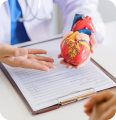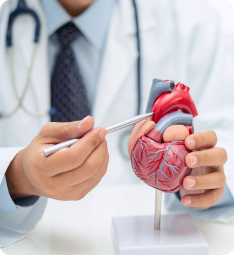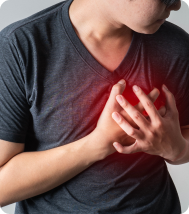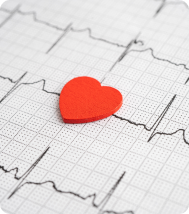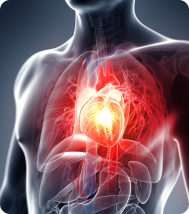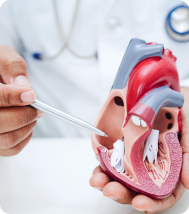Different Causes of Heart or Chest Pain
Chest pain is a common complaint that has a variety of causes, ranging from mild and harmless to serious and potentially life-threatening. Most cases of chest pain have something to do with the heart, which is why it is also referred to as heart pain.
However, there are also many types chest pain that are caused by conditions affecting the lungs, oesophagus, skin, muscles and bones. In some cases, pain can also extend up to the neck or down to one or both arms.
Chest or Heart Pain Due to Heart Attack
Chest pain near the heart is a common symptom of an impending heart attack. Medically known as myocardial infarction, a heart attack occurs when the heart is not getting enough blood due to an interrupted blood flow caused by a build up fat and cholesterol.
Symptoms of a heart attack include:
- Burning or a squeezing sensation in the chest
- Pain or discomfort that extends to the jaw, neck, throat, back and arms
- Painful or difficulty breathing, or shortness of breath
- Sudden dizziness or lightheadedness
- Indigestion or heartburn
- Nausea
- Cold sweats
- Fatigue
It’s important to note that chest pain doesn’t always involve the heart. There are other common causes of chest pain, and it is important to seek medical attention to rule out cardiac factors, and seek proper treatment nonetheless.
Some other causes of chest pain include:
- Panic attack – This refers to a brief but intense episode of overwhelming fear. It is accompanied by rapid heartbeat, sweating, and feelings of danger, loss of control and fear of death.
- Hernia – This occurs when an internal organ pushes against and protrudes out of a weak spot or hole in the muscle or tissue that holds it.
- Gallstones – These are hardened materials that form in the gallbladder. While small gallstones can naturally pass from the body, larger ones can block bile ducts and cause intense pain.
- Heartburn – This refers to a burning sensation in the chest that is often worse after eating. It is a common symptom of acid reflux and gastroesophageal reflux disease (GERD) and is often accompanied by an acidic taste in the mouth.
- Muscle Pain – Chest or heart pain may also be induced by overuse, injury or inflammation of the muscles and tissues of the chest.
- Asthma – This occurs when the airways become narrow and swollen, making it difficult to breathe. This can generally be managed through inhalers.
- Pinched nerve – A pinched or compressed nerve in the neck or collarbone can contribute to chest or heart pain. This pain may also be accompanied by a tingling sensation or numbness.
- Pulmonary embolism – This occurs when a blood clot forms in a blood vessel and travels through the bloodstream and blocks a pulmonary artery or blood vessel in the lungs. A pulmonary embolism is a medical emergency.
- Pleurisy – This refers to the inflammation of the pleura, the thin layer of tissue that separates the lungs from the chest wall. Pleurisy also causes chest pain that grows worse when breathing, sneezing or coughing.
When Should You Seek Medical Attention?
All forms and types of heart pain, whether sharp or dull, or sudden or persistent, or aching or burning, should be immediately checked by a medical professional. Regardless of whether there is a heart-related cause, it is important to get it diagnosed and properly treated. Contact us today to schedule a consultation for more information.
Meet Our Cardiologist
Dr Eric Hong
MB BCh (Ireland), MRCP (United Kingdom) FAMS (Cardiology), DIP (CBNC, USA) FSCAI (SCAI, USA), FACC (ACC, USA) FESC (European Society of Cardiology, France) FRCP (Edinburgh, United Kingdom)

Dr Eric Hong is a dedicated cardiologist in Singapore with over 20 years of experience caring for heart patients.
He is one of few cardiologists in Singapore who subspecialises in interventional cardiology, nuclear cardiology, and multi-modal cardiac imaging. Committed to achieving the best possible outcomes for his patients, heart specialist Dr Eric Hong brings diverse experience from Ireland and the United States, and is double fellowship-trained in the USA.


